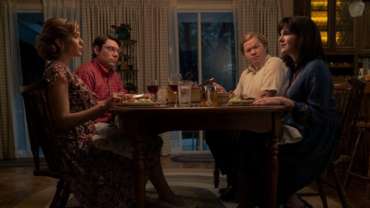The murder of Betty Gore by Candy Montgomery with an axe in 1980 has been a subject of fascination in true-crime circles for decades. The story has been adapted into multiple podcasts, true-crime series, and now two miniseries, including HBO Max’s “Love & Death,” which premiered recently. The series features a talented cast, with Elizabeth Olsen delivering a mesmerizing performance as Montgomery, supported by Jesse Plemons and Tom Pelphrey.
Kelley’s approach captures the mundanity of suburban life in Texas, where Montgomery lived with her husband, Pat, and seemed content with her church and marriage until she began an affair with Allan Gore, Betty’s husband. The show does not frame the murder as a story of obsession, as Candy has always claimed self-defense. However, the series dives into the legal proceedings surrounding the case, with Pelphrey’s excellent portrayal of Montgomery’s lawyer Don Crowder.
While the storytelling leaves something to be desired, the series provides a fresh take on the Montgomery story. One of the weaknesses of the show is that it lacks depth in Betty’s character, but Plemons delivers an outstanding performance as Allan, shifting the focus more towards his character. However, the show ultimately belongs to Olsen, who portrays Candy with nuance and complexity, forcing viewers to question their understanding of her character.
The success of “Love & Death” owes much to the talented cast and the director’s vision. Elizabeth Olsen delivers a tour-de-force performance as Candy Montgomery, embodying her character’s complex blend of religious devotion, repressed desires, and eventual violence. Jesse Plemons and Lily Rabe also shine as Allan and Betty Gore, respectively, bringing depth and nuance to their roles despite limited screen time. However, some may argue that the lack of character development for Betty Gore undermines the story’s emotional impact. Meanwhile, Tom Pelphrey delivers an excellent turn as Candy’s attorney Don Crowder, providing a grounded counterpoint to the heightened emotions of the trial.
Director Lesli Linka Glatter, best known for her work on “Homeland,” demonstrates a deft hand in capturing the quiet moments of suburban life as well as the tense drama of the courtroom scenes. Her vision for the series strikes a balance between empathy for the characters and a clear-eyed view of the brutal murder at its center.
David E. Kelley, the creator of “Love & Death,” is known for his extensive experience in television, with a career spanning over three decades and many successful series under his belt. He has a distinct style that blends legal drama with character-driven storytelling, and this approach is evident in “Love & Death.” Kelley’s writing for the series is deft and engaging, capturing the complexity of the real-life events while also providing a thoughtful examination of the human psyche. He avoids the typical true crime tropes and instead focuses on the characters, their relationships, and the emotional toll of the crime.
Despite its flaws, “Love & Death” remains compelling, and Olsen’s powerful portrayal of Montgomery makes it worth watching.

